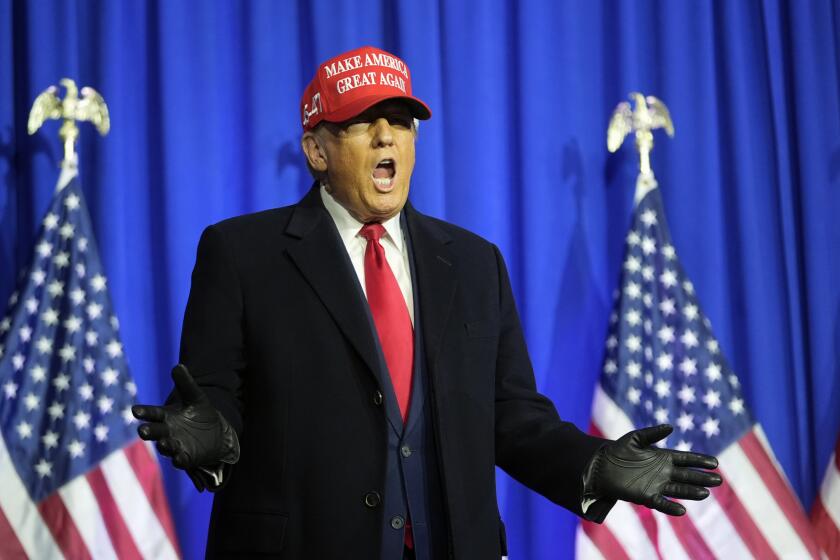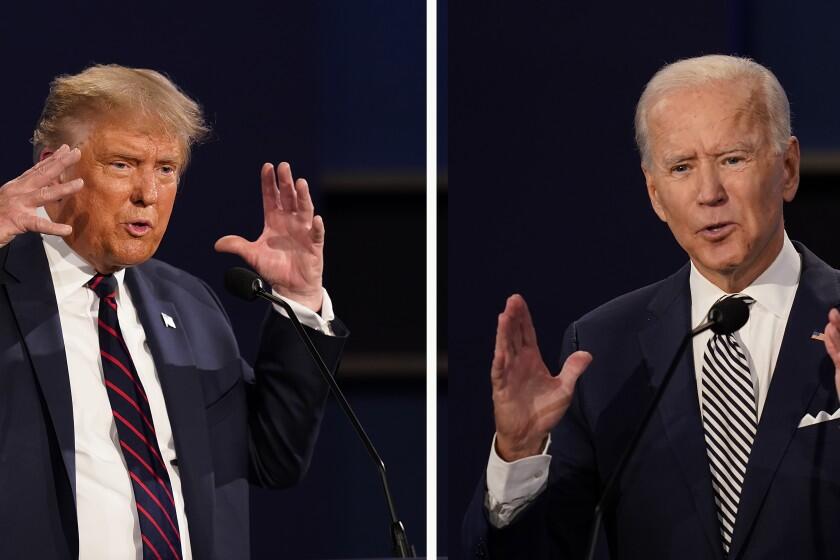Column: Trump wants to round up over a million undocumented migrants from California. Here’s how he might do it

- Share via
WASHINGTON — Former President Trump has focused relentlessly on illegal immigration as a centerpiece of his campaign for the White House, just as when he first ran in 2016.
“They’re poisoning the blood of our country,” he has said of undocumented migrants, using language redolent of the racist doctrines of Adolf Hitler.
He promises to launch “the biggest domestic deportation campaign in American history” on Day One of his new presidency.
His chief immigration advisor, Santa Monica-born Stephen Miller, has spelled out what that would mean: Trump would assemble “a giant force” including National Guard troops to seize undocumented migrants, transport them to camps in Texas and expel them.
“A very conservative estimate would say about 10 million,” Miller told pro-Trump talk show host Charlie Kirk.
If “unfriendly states” — like California — don’t want to cooperate, Miller said, Trump could order Guard units from red states like Texas to cross their borders to enforce the law.
Former President Trump is bashing California in his 2024 campaign; if he wins he wants to force it to change — on environment, immigration, LGBTQ issues and more.
The operation would be “as daring and ambitious … as building the Panama Canal,” Miller promised.
That’s a pretty bloodless way to describe a process that would uproot thousands of families, separate children from their parents and disrupt communities. But before we get to that, a preliminary question:
If he wins in November, could Trump really do that?
From a legal standpoint, the answer is yes.
If Trump invokes the Insurrection Act and declares that the National Guard is needed to enforce federal immigration law, he could send Texas troops into California whether Gov. Gavin Newsom agrees or not, legal scholars said.
“We normally don’t want the military enforcing the law inside the country; law enforcement is supposed to be provided by police forces that are local — and locally accountable,” said William Banks, an emeritus professor of law at Syracuse University. “But the Insurrection Act gives the president sweeping authority. You could drive a lot of trucks through that law.”
Newsom would presumably file a lawsuit against Trump to try to block the move, but it would almost certainly fail.
Biden and Trump offer converging narratives about the country: one optimistic, one apocalyptic. That collision is the core of the 2024 election.
“No state has ever sued successfully to stop a deployment of the Guard under the Insurrection Act,” warned Joseph Nunn of the Brennan Center for Justice at New York University.
There are also practical concerns. Most National Guard units are neither trained nor equipped for law enforcement missions.
“Tracking down undocumented migrants is complicated and time-consuming,” Nunn noted. “You need people who know how to do it, like ICE [Immigration and Customs Enforcement] agents.
“The Guard would resist that kind of mission mightily,” added Banks. “They hate this kind of stuff. They would be better suited to patrol the border — to stand next to the wall, the fence or the river and discourage people from coming across.”
So if Trump listens to his generals — not a sure thing — he’d be more likely to use Guard units to bolster weak spots on the border and manage those newly built transit camps for deportees.
Tariffs on foreign goods aren’t paid by other countries; they’re paid by American consumers — and they often fail to protect jobs.
That would free up ICE agents for raids on Central Valley farms and Los Angeles sweatshops — which is what immigration agents did in earlier crackdowns, including the offensively named Operation Wetback, which expelled more than a million Mexican migrants (and some U.S. citizens) in 1954.
So legally, there may not be that much California can do. But the fallout in a state home to an estimated 1.9 million undocumented people — roughly 5% of the population — would be difficult to imagine.
The human impact of uprooting most or all of these California residents would be gigantic. Many undocumented migrants are members of families that include legal residents and U.S. citizens, including children.
Many are deeply rooted in their communities; more than two-thirds have lived in the state longer than 10 years, according to one estimate.
“When you harm the undocumented, you harm U.S. citizens too,” said Angelica Salas, executive director of the Coalition for Humane Immigrant Rights in Los Angeles.
Polls suggest that if the election were held tomorrow, Trump would narrowly win. But his unpopularity rivals Biden’s, and a lot could change in the next nine months.
“I’ve seen families devastated by the deportation of their loved ones. I’ve seen families, when the father is deported, go right into economic ruin,” Salas said. “The trauma for children, especially small children, is enormous.”
The economic impact of mass deportations would be huge, too. An estimated 1.5 million California workers, more than 7% of the state’s workforce, are undocumented. About half work in agriculture, construction, hospitality and retail, industries that already suffer from severe labor shortages.
Federal Reserve Chair Jerome H. Powell said this month that the growth of immigrants in the workforce had strengthened economic growth. “It’s just arithmetic,” said Powell, a Trump appointee. “If you add a couple of million people to an economy … there will be more output.” Abruptly subtracting a million or more would have the opposite effect.
Trump advisors aren’t planning to stop at removing undocumented people from the country.
Miller wants to go after some people in the country legally too.
He has proposed expanding the criteria for deportation to include people with valid visas “whose views, attitudes and beliefs make them ineligible to stay” in the eyes of the new Trump administration.
Trump hasn’t officially won the Republican nomination. But he’s already throwing his weight around on foreign policy — and Republicans in Congress are falling in line.
“The obvious example here would be all of the Hamas supporters who are rallying across the country,” he said.
An immigration task force organized by the conservative Heritage Foundation and led by a former Trump administration official proposed blocking Federal Emergency Management Agency grants to state and local agencies that refuse to cooperate with ICE enforcement operations, a standard that would presumably disqualify most or all California agencies.
The task force also proposed denying federal loans and grants to students at universities that allow undocumented migrants to pay in-state tuition, a rule that would affect UC and the Cal State systems.
It adds up to a recipe for a major collision with California, the state most out of step with Trump’s determination to rid the country of undocumented migrants.
None of this constitutes a defense of the Biden administration’s policies, which have failed to deter thousands of migrants from crossing the border and applying for asylum on often-dubious grounds.
In swing states, where Biden doesn’t have a big Democratic cushion to protect him, the impact of independent and third-party candidates could be enough to swing the outcome to Trump.
But it’s worth remembering that only a few weeks ago, Trump ordered Republicans in Congress to kill a bipartisan bill that would have increased funding for immigration enforcement and raised the bar for asylum claims — because, as he admitted, he didn’t want to allow President Biden to appear as if he was fixing the problem.
When Trump was first elected in 2016, I wrote that on immigration policy, “His bark may prove worse than his bite.”
I was wrong. He turned out to be dead serious.
Trump’s promises of mass deportations and detention camps should be taken seriously — and literally, too.
“If he says he’s going to do it, believe him,” Salas said.
More to Read
Sign up for Essential California
The most important California stories and recommendations in your inbox every morning.
You may occasionally receive promotional content from the Los Angeles Times.

















